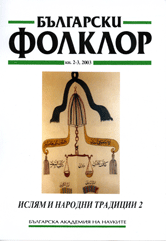"И то душа носи..." - отношението към домашните животни в мюсюлманската традиция
"It also Has a Soul" - the Attitude towards Domestic Animals in Muslim Tradition
Author(s): Goran BlagoevSubject(s): Anthropology
Published by: Институт за етнология и фолклористика с Етнографски музей при БАН
Summary/Abstract: According to the traditional beliefs, domestic animals are creatures of Allah - he gives them away to the people, who should use them as working force or food. This is also true for the species, which are accepted as kurban, according to the canon - their destiny is also predetermined from above. The animals, which are suitable for sacrifice, go into the subordination between the Creator and the creations - they are called upon not only to feed man, but also to fulfill a higher sacrificial function as mediators between people and God. So the offering of kurban is not a result of human desire - it is following of a model, established by God. Because of that reason, the animal is "always happy to be killed for kurban at any time". Most of the Bulgarian Muslims believe that Allah has given those animals to man - by sacrificing them, man fulfills Allah's will. This belief is a periphrasis of a Koranic text (Koran XXII: 27). Pronouncing God's name before any kind of killing, including sacrifice, is a general Islamic practice and lies in the basis of the rules for painless mortification - the so called nahr. It shows that the action is carried out to the name of God. Otherwise killing the animal is considered illegal and is estimated as a sinful deed. That is why popular Islam gives practical importance to pronouncing Allah's name - people believe that in this way they appeal for the participation and support of God, who has to take part in the destruction of the sacrificial animal, i.e. of his own creation. Calling upon God, the man takes off from himself the guilt for the committed crime - the killing of the animal. The general Muslim belief presents Allah as loving each of his creatures, despite the destiny he has assigned to it. That is why the divine predestination of the kurban could not be viewed only in its fatalistic aspect, justifying the killing of the animal. The Muslim should take care for and pay attention to all creatures of Allah - especially to the animals in his home and farm. Popular culture often treats domestic animals as a part of the family circle - before the act of sacrifice the animal is the object of a number of practices, which give it a status similar to the status of the individual in the settlement community. After the killing, the practices of respect towards the corpse of the animal resemble the attitude to a close dead person.
Journal: Български фолклор
- Issue Year: XXIX/2003
- Issue No: 2-3
- Page Range: 88-103
- Page Count: 16
- Language: Bulgarian
- Content File-PDF

